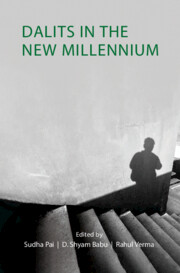Book contents
- Frontmatter
- Contents
- List of Figures
- List of Tables
- Acknowledgements
- 1 Introduction: Dalit Discourse in the New Millennium
- Part I Shifting Patterns of Electoral Politics
- Part II Popular Culture, Discourse, and Protest
- Part III Transformations in Ideology and Identity
- Part IV Aspirations and Anxieties
- Part V Discrimination and Representation
- 20 Do Scheduled Caste Reservations for Political Office Improve the Lives of Dalits?
- 21 Are Dalit Legislators Performing Their Oversight Role? Evidence from the Question Hour in the Lok Sabha and Select State Legislatures
- 22 Why Are Some Backward Castes Demanding Scheduled Caste Reservation?
- 23 Measuring Caste-Based Discrimination
- 24 Dalit Suicides in India
- About the Contributors
- Index
22 - Why Are Some Backward Castes Demanding Scheduled Caste Reservation?
from Part V - Discrimination and Representation
Published online by Cambridge University Press: 12 July 2023
- Frontmatter
- Contents
- List of Figures
- List of Tables
- Acknowledgements
- 1 Introduction: Dalit Discourse in the New Millennium
- Part I Shifting Patterns of Electoral Politics
- Part II Popular Culture, Discourse, and Protest
- Part III Transformations in Ideology and Identity
- Part IV Aspirations and Anxieties
- Part V Discrimination and Representation
- 20 Do Scheduled Caste Reservations for Political Office Improve the Lives of Dalits?
- 21 Are Dalit Legislators Performing Their Oversight Role? Evidence from the Question Hour in the Lok Sabha and Select State Legislatures
- 22 Why Are Some Backward Castes Demanding Scheduled Caste Reservation?
- 23 Measuring Caste-Based Discrimination
- 24 Dalit Suicides in India
- About the Contributors
- Index
Summary
The Constitution of India, under article 16(4), makes provision for reservation in ‘favour of any backward class of citizens’ in the distribution of public offices, employment, and educational opportunities. The insertion of the provision on ‘backward class of citizens’ in the Constitution had initiated intense debate in India's Constituent Assembly. The members deliberated upon the meaning of ‘backward classes’ and arrived at one conclusion that ex-untouchable castes and tribal communities, which had been enumerated as Scheduled Castes (SCs) and Scheduled Tribes (STs) under the Government of India Act, 1935, were a section of the backward classes. Therefore, they were placed under articles 341 and 342 of the Constitution. However, there were castes and communities which were not included in the list of SCs and STs but were backward. To identify them, article 340 was inserted in the Constitution, empowering the president of post-colonial India to appoint a commission for investigating the condition of socially and educationally backward classes and suggesting possible measures for removing their disabilities.
Under article 340, three backward-classes commissions have been appointed till date. The Jawaharlal Nehru government had appointed the first commission in 1953, under the chairmanship of Kaka Kalelkar, which submitted its report in 1955. The Janata Party government of Morarji Desai appointed the second commission in 1978, under the chairmanship of B. P. Mandal, which submitted its report in 1980. On the recommendations of these commissions, particularly the second commission, popularly known as the Mandal Commission, a third category of backward classes emerged – namely, the Other Backward Classes (OBCs). Although the term ‘classes’ has been used in official documents, it is a euphemism for a grouping of castes in the middle of the caste hierarchy, distinct from upper castes, intermediate castes, SCs, and STs. On the recommendation of the Mandal Commission, the OBCs have been given reservation in public offices, employment, and educational institutions.
The Narendra Modi government appointed the third backward-classes commission in 2017, under the chairpersonship of G. Rohini, which is yet to submit its report despite multiple extensions of its tenure (Pandey, 2022).
- Type
- Chapter
- Information
- Dalits in the New Millennium , pp. 394 - 413Publisher: Cambridge University PressPrint publication year: 2023



